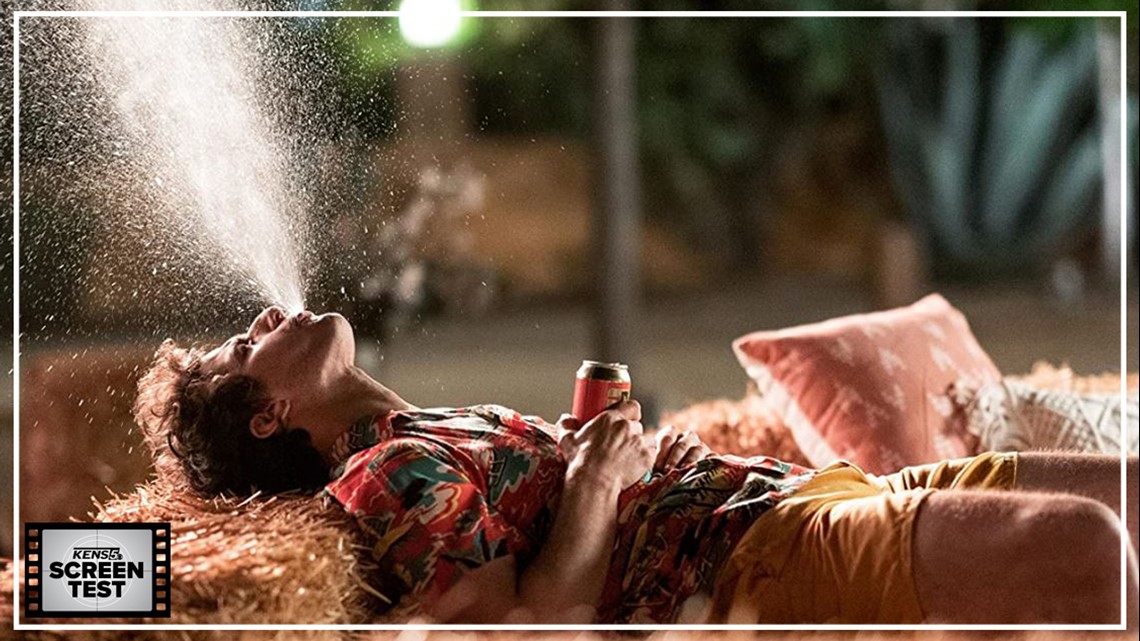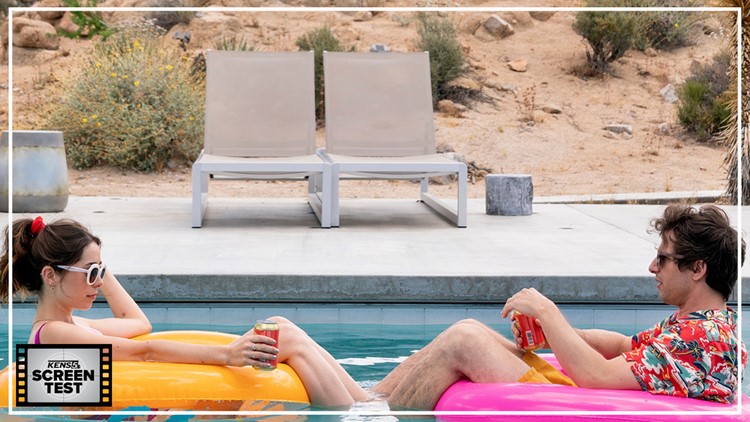Take a second to look at what’s around you right now—your dog, the pot of coffee, your roommate or spouse, the pattern of sticky notes and photos on the fridge, the cloth mask siting under your car keys. All familiar things made even more so, perhaps uncomfortably so, as most of us continue to stay home amid an ongoing pandemic. All things that, at this point, have come together as a representation of safety more acute than whatever our houses or apartments or rooms may have represented before…or, just as likely, you’re at the point where it’s not newfound gratitude you’re feeling for all those things and people, but exasperation from overfamiliarity; a tinge of claustrophobia inextricably linked with 2020’s dominating question, one that has gotten less clear the most time goes on: When the hell will we return to a normal, pre-pandemic way of life?
As so many other things have taken on new significance in the age of COVID-19, so too – undoubtedly – has “Palm Springs,” a lovely Andy Samberg and Cristin Milioti-starring comedy riffing on “Groundhog Day’s” familiar stuck-in-time formula with an extra sprinkling of existential questioning and Samberg-stamped absurdity. The movie, directed by Max Barbakow, was made with a light touch on heavy material about unbreakable connection – its initial delights and its eventual consequences – through the lens of its fresh what-if: What if you were stuck reliving the same day on repeat…with another person, an eternal roommate, caught in the same unexplainable loop?
The movie makes good (and good fun) on its evolved galaxy-brain premise; Samberg and Milioti are a deliriously entertaining pairing and “Palm Springs” is a satisfying romp in this and any other year. But its obvious, unintentional appeal as an allegory for our way of life in 2020 means its outlandishness is suddenly resonant, its themes of human forgiveness and frustrations and helplessness suddenly a philosophical road map for navigating a period of socio-economic upheaval. Six months after premiering at Sundance, one of the last major in-person U.S. events before the health crisis began, “Palm Springs” is ready to hit Hulu—and it’s been crafted by fate as one of the more appropriate artifacts of a summer spent largely indoors, with the same people, questioning the limits of our isolation in an increasingly surreal situation.
“Palm Springs,” crucially, is welcomingly frank about the narrative confines it’s operating within. “It’s one of those infinite time loop situations you might have heard about,” Samberg’s Nyles casually tells Milioti’s Sarah after she follows him into a strange glowing cave in the California desert, ensuring her ticket onto the cosmic carousel from which there’s no departure.
Next thing we know, she wakes up that morning, hours before the desert wedding of her sister she’s warily attending, screaming in Nyles’s face for answers. It’s another of “Palm Springs’s” twists that – and some may consider this a minor spoiler – he’s already been caught in this day for God knows how long; suddenly it makes sense why Nyles previously hijacked the wedding after endlessly slamming down beers as if tomorrow didn’t matter—he already knows it doesn’t. It’s a perverted worldview we may find ourselves sharing (“I try to live my life at this point with as little effort as possible” is just one line that rings sharp in the age of social distancing), and it doesn’t take long for Sarah to buy in. Theirs is a relationship that sparks with a mutual apathy about life, and so they grab it by the kerosense-drenched horns with increasingly carefree and adventurous abandon.
In a different timeline, Nyles and Sarah’s literalization of “live like there’s no tomorrow” might have us feeling envious—who wouldn’t want the chance to forget about obligations of love and life while living out eternity under the warm California sun (certainly a step up from frigid Punxsutawney) and floating blissfully on rubber-ducky pool floats? The idea is alluring, cathartic even, and “Palm Springs” puts it front and center with a joyous mid-movie montage that sees our protagonists engaging in increasingly reckless excursions, much to the horror of wedding-goers and the general local population (the movie’s colorful Laffy-Taffy palette is enough to trick one into thinking this is a situation you’d be glad to Stockholm Syndrome yourself into).
But for as zany as “Palm Springs” gets in its most outright entertaining stretches, it never succumbs to the expectation that its premise is superfluous. Barbakow – working off a screenplay from Andy Siara for his feature debut – takes care to ensure that wackiness doesn’t sugarcoat the nihilism embodied Nyles and Sarah, but works in tandem with it. They’re taking both the red and blue pills; the more they revel in an ostensisbly consequence-free situation, the more “Palm Springs” tips the scales for some soul-searching to come later, using rom-com tropes as the microscope to examine how long we’d be able to stand being stuck with someone in the same day…or in the same living space on what feels like the same day.


The cosmic joke Nyles and Sarah are the butt of isn’t all too different from the laughingstock this year has made our way of life out to be. They find increasingly brazen ways to spend their day(s); we see ourselves finding new ways of passing the time inside. Whatever plans they had for their future is indefinitely on hold; whatever plans we had for spring and summer hasn’t happened how we intended. Every insinuation about the cruelty of routine feels timelier than the movie’s creators probably intended, every nugget about making the most of a bad situation given near-uncanny levels of urgency. “Your best bet is just to learn how to suffer existence,” Nyles says at one point, and the line reads like wisdom when it may have been just a cynical punchline six months ago.
Samberg’s casual smugness makes him perfect for the part, and makes a perfect juxtaposition to the wake-me-up-from-this-nightmare reaction that Sarah initially has. If Bill Murray’s deadpan acceptance of his surreal time-continuum entrapment is one reason the comparatively subdued “Groundhog Day” continues to resonate as a classic, then Milioti’s frenzied aura – the way her eyes widen into searchlights – synchronizes perfectly with the easygoing, yet chaotic energy of “Groundhog Day’s” latest imitator. And as both begin to redefine their happiness and loneliness, Samberg and Milioti are more than up to the task of meeting Siara’s story in a place of legitimate sincerity, even as the final act takes a turn for the superlatively, off-puttingly literal.
For all the pandemic-inspired tales that TV and cinema are inevitably going to bring in the coming years, there’s something pre-emptively special about how “Palm Springs” has unwittingly set the bar. It’s already highly effective as a romantic-comedy that never asks to be taken too seriously, and so it’s inescapably ironic how I’ve come away from the movie marveling at how it holds a mirror up to our lives right now—lending it a sense of import that Samberg or Milioti or Barbakow or Siara never quite ask for. But it also rings true to the movie’s spirit. In “Palm Springs,” Nyles and Sarah create a universe out of the things and places and people that are readily accessible in the California desert, before making an extremely personal reckoning out of it. What’s to come of the endless hours inside our homes – working from home, eating takeout at home, finding new hobbies and interests and sides of ourselves at home – if not a more visceral acknowledgement of the things within our arm’s reach, and, finally, a reckoning with them?
"Palm Springs" is rated R for sexual content, language throughout, drug use and some violence. It's streaming on Hulu beginning Friday.
Starring: Andy Samberg, Cristin Milioti, J.K. Simmons, Peter Gallagher
Directed by Max Barbakow
2020
MORE SCREEN TEST REVIEWS
- ‘Desperados’ Review: Netflix’s latest will take you through the seven circles of cliché hell
- 'The Truth' Review: Catherine Deneuve shines in Hirokazu Kore-eda's drama about family, memory and narrative
- ‘Eurovision Song Contest’ Review: Overlong Will Ferrell-Rachel McAdams comedy is enjoyable when it leans into the outrageous
- The best movies from the first half of 2020
- ‘My Spy’ Review: Dave Bautista’s talents are wasted in uninspired genre mashup
- ‘House of Hummingbird’ Review: Tender South Korean drama finds empathy in harrowing moments of teenagerdom
- 'Shirley' Review: Elisabeth Moss powers bewitching psychological drama about an author and her muse
- 'Babyteeth' Review: Familiar coming-of-age narrative is given reinvigorating new life in Shannon Murphy's directorial debut
- ‘7500’ Review: Joseph Gordon-Levitt stars in high-altitude thriller whose thrills succumb to narrative weightlessness
- 'The King of Staten Island' Review: Judd Apatow-Pete Davidson collaboration is a hilarious jaunt that can get lost in its sentimentality



